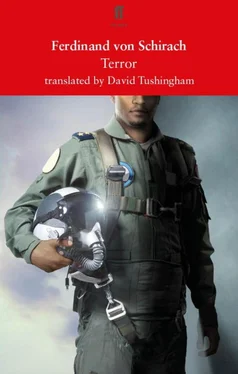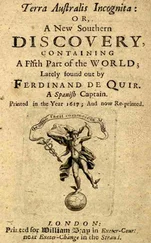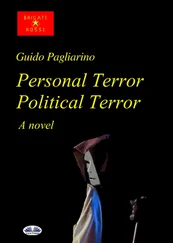Ferdinand von Schirach - Terror
Здесь есть возможность читать онлайн «Ferdinand von Schirach - Terror» весь текст электронной книги совершенно бесплатно (целиком полную версию без сокращений). В некоторых случаях можно слушать аудио, скачать через торрент в формате fb2 и присутствует краткое содержание. Город: London, Год выпуска: 2017, ISBN: 2017, Издательство: Faber & Faber, Жанр: drama, Драматургия, на английском языке. Описание произведения, (предисловие) а так же отзывы посетителей доступны на портале библиотеки ЛибКат.
- Название:Terror
- Автор:
- Издательство:Faber & Faber
- Жанр:
- Год:2017
- Город:London
- ISBN:978-0-571-34076-7
- Рейтинг книги:5 / 5. Голосов: 1
-
Избранное:Добавить в избранное
- Отзывы:
-
Ваша оценка:
- 100
- 1
- 2
- 3
- 4
- 5
Terror: краткое содержание, описание и аннотация
Предлагаем к чтению аннотацию, описание, краткое содержание или предисловие (зависит от того, что написал сам автор книги «Terror»). Если вы не нашли необходимую информацию о книге — напишите в комментариях, мы постараемся отыскать её.
Enter the courtroom, hear the evidence, make your judgement.
A hijacked plane is heading towards a packed football stadium. Ignoring orders to the contrary, a fighter pilot shoots down the plane killing 164 people to save 70,000.
Put on trial and charged with murder, the fate of the pilot is placed in the audience's hands.
Ferdinand von Schirach's
, in a translation by David Tushingham, received its UK Premiere at the Lyric Hammersmith, London, in June 2017
Terror — читать онлайн бесплатно полную книгу (весь текст) целиком
Ниже представлен текст книги, разбитый по страницам. Система сохранения места последней прочитанной страницы, позволяет с удобством читать онлайн бесплатно книгу «Terror», без необходимости каждый раз заново искать на чём Вы остановились. Поставьте закладку, и сможете в любой момент перейти на страницу, на которой закончили чтение.
Интервал:
Закладка:
In 1951 the German philosopher of ethics Hans Welzel described the so-called trolley problem: on a steep mountain railway, a goods train runs out of control. With all its weight it hurtles down the track into the valley heading for a tiny station. Here, a passenger train is waiting. If the goods train keeps going it will kill hundreds of people. Now imagine for a moment that you are in the signal box. You have the opportunity to change one of the points and divert the goods train on to a siding. The problem is that there are five workmen in this siding repairing the track. If you divert the train, you will kill those five workmen but save hundreds of passengers. What would you do? Would you accept the death of those five people as the price to be paid?
Indeed most people would divert the train. And after some consideration we believe that it is the right thing to do.
But if the scenario is changed only slightly, then it immediately becomes much more complicated. In 1976, Judith Thomson, an American moral philosopher, suggested a variant to this example: the goods train is still hurtling down the mountain, but now there are no points that you can change. You are now a bystander, standing on a bridge, watching what is going on. Next to you is an extremely fat man. If he were to fall off the bridge, he would land on the track. He would be run over, but his body would stop the train. Now you can’t simply push the man off, he’s much too fat and too strong. So you would have to kill him first, with a knife, for example, then you could throw him down. If you did that you could save the passengers. What would you, ladies and gentlemen judges, do now?
Yes, most people would refuse to kill the man. But what has acutally changed? In fact there’s just one thing: we would now have to use our own hands. We would have to kill a human being ourselves with our own hands. And we can’t do that. Even though there is hardly any difference between the two situations, in our heads everything has changed. In the first case we are prepared to kill five people – but now it’s impossible for us to kill only one. Suddenly it no longer seems possible for us to make the right decision. Ladies and gentlemen, we must therefore accept that there is no certainty in moral questions.
We make mistakes, we make them over and over again, it is in our nature – we cannot help it. Morality, conscience, common sense, natural law, extra-legal state of emergency – each one of these terms is suspect, they shift, and it is in their nature that we cannot be certain what the correct course of action is today and whether we will draw exactly the same conclusions tomorrow.
So we need something more reliable than our spontaneous convictions. Something that we can use to judge by at any time and that we can hold on to. Something that provides us with clarity amid the chaos – a guideline which applies even in the most difficult situations. We need principles .
And, ladies and gentlemen judges, we have given ourselves these principles. They are our constitution. We have agreed to judge each individual case by it. Every case is to be measured by it and tested by it. By that constitution – not by our consciences, not by our morals and certainly not by any other higher power. Law and morality must be kept strictly separate.
It has taken us a long time to understand: this is the essence of a state based on justice. You all know what a high price we have had to pay for this knowledge. Only what has become law may be binding for all. A true law passed through the complex democratic procedures of our parliament. And that is why laws, even if to some of us they may appear immoral or wrong, remain valid. Our only recourse is to repeal them. And moral views? Regardless of how correct they may appear to us – they bind no one. Only the law and nothing else can do that. And what is more: a ‘morally correct’ view may never be placed above the constitution. At least not in a functioning democratic state based on justice.
Now you will also be aware that the constitution allows for a right to resist. There may be laws which lead to such intolerable injustice that to apply them would be inhuman. However, ladies and gentlemen judges, we really cannot say that in the case of Lars Koch: this was not about killing a tyrant.
Our constitution is a collection of principles which must always and unreservedly take precedence over morals, conscience and any other notion. And the highest principle of this constitution is human dignity.
Our constitution begins with the sentence: ‘Human dignity shall be inviolable.’ It isn’t at the beginning by accident. That sentence is the most important statement in the constitution. This first article is ‘guaranteed in perpetuity’– that means it cannot be amended as long as the constitution is in force. But what is this dignity actually? The Federal Constitutional Court says that dignity means a human being may never be turned into a mere object of action by the state. ‘A mere object of action by the state’: what does that mean? The idea can be traced back to Kant. Human beings, says Kant, are able to give themselves their own laws and act according to them, and that is what distinguishes them from all other creatures. They recognise the world and they can think about themselves. This makes them subjects and not mere objects, like a stone. Every human being possesses this dignity.
If decisions are made about any person over which they can have no influence, if decisions are made over their heads, then they become objects. And it is therefore clear: the state may never weigh one life against another. And not against a hundred, or against a thousand lives either. Every individual person – and every one of you ladies and gentlemen judges – possesses this dignity. People are not objects. Life cannot be measured in numbers. It is not a market.
Is this only an idea of professors and philosophers? A demand made by Constitutional Court judges who make their judgements far removed from the stresses of our normal lives? No, quite the opposite. The consequences of a decision that ignores human dignity are what you can see here in the case of Lars Koch. Think of the soldiers in the National Situation and Command Centre. If they had all acted according to the constitution, this situation would never have occurred. Because then the stadium would have been evacuated and only a few people would have been in danger. It is up to you, ladies and gentlemen, in your role as judges, to make clear that that is something you will not tolerate. You do not want the constitution to be breached in the way which the former Minister of Defence demanded.
Of course when Lars Koch shot the Lufthansa plane down the stadium was full. It is no fault of his that those soldiers acted in breach of the constitution. But what is relevant to him is the question raised in this trial by the joint plaintiff: could the passengers have overpowered the terrorist? Could they have beaten down the door to the cockpit? How far did they get? Would there have been time? – We don’t know. Could the pilot have acted differently? He was facing his own death and that of so many other people. Would he not have been able to lift the plane up at the last moment to save the people in the stadium? – We don’t know. Could the co-pilot have knocked the gun out of the terrorist’s hand at the last moment? Might everything have turned out alright in the end? – We don’t know that either. And why don’t we know all this? Because the defendant took a decision. He alone decided that the passengers had to die. He had no order to do so, quite the opposite. He knew that he was acting in defiance of his orders, in defiance of our laws, in defiance of the constitution and in defiance of our courts. Lars Koch was trained to make the correct decision in the most trying circumstances. Before that day he had thought hundreds of times about what he would do. And that is why he must now bear the consequences. Lars Koch, ladies and gentlemen, is not a hero. He killed. He turned people into mere objects in his own hands. He denied them any opportunity to make a decision… he took away their human dignity.
Читать дальшеИнтервал:
Закладка:
Похожие книги на «Terror»
Представляем Вашему вниманию похожие книги на «Terror» списком для выбора. Мы отобрали схожую по названию и смыслу литературу в надежде предоставить читателям больше вариантов отыскать новые, интересные, ещё непрочитанные произведения.
Обсуждение, отзывы о книге «Terror» и просто собственные мнения читателей. Оставьте ваши комментарии, напишите, что Вы думаете о произведении, его смысле или главных героях. Укажите что конкретно понравилось, а что нет, и почему Вы так считаете.












